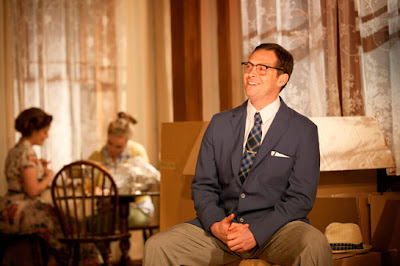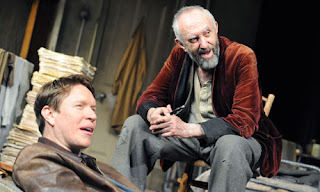 It's a play that is as savage as it's funny, as insightful as it is provocative, as tender as it is angry.
It's a play that is as savage as it's funny, as insightful as it is provocative, as tender as it is angry.Norris has written it as a companion piece to Lorraine Hansberry's groundbreaking A RAISIN IN THE SUN which in 1959 was the first play performed on Broadway by a black female playwright. If like me you have never seen it then panic ye not, it will not spoil your enjoyment of CLYBOURNE PARK.
The subject of Hansberry's play is a black working-class family being given the opportunity to move to a house in the totally white neighbourhood of Clybourne Park. They are visited by Karl Lindner (the play's only white character) from the area's housing Improvement Committee who attempts to buy them off but they refuse. Norris' launchpad for his play is what was the reason for the house coming on the market so cheaply in the first place and what neighbourly disapproval did the seller face for accepting the offer and how the subject of race has echoed down the generations since then. The play opens in 1959, Russ and Bev are preparing for a move to a new house further out in the suburbs. Bev is a housewife who is kept afloat by her duties and her hyper-active packing is shared with Francine, the family maid. The whirlwind of preparing for the move is disrupted by two friends, Jim the local priest and Karl the head of the neighbourhood committee. Soon the real reason for the couple's decision to sell their house cheaply is revealed - their son returned from fighting in Korea charged with a village massacre and after being ostracised by the community, hung himself in his bedroom.
The play opens in 1959, Russ and Bev are preparing for a move to a new house further out in the suburbs. Bev is a housewife who is kept afloat by her duties and her hyper-active packing is shared with Francine, the family maid. The whirlwind of preparing for the move is disrupted by two friends, Jim the local priest and Karl the head of the neighbourhood committee. Soon the real reason for the couple's decision to sell their house cheaply is revealed - their son returned from fighting in Korea charged with a village massacre and after being ostracised by the community, hung himself in his bedroom.
The subject of Hansberry's play is a black working-class family being given the opportunity to move to a house in the totally white neighbourhood of Clybourne Park. They are visited by Karl Lindner (the play's only white character) from the area's housing Improvement Committee who attempts to buy them off but they refuse. Norris' launchpad for his play is what was the reason for the house coming on the market so cheaply in the first place and what neighbourly disapproval did the seller face for accepting the offer and how the subject of race has echoed down the generations since then.
 The play opens in 1959, Russ and Bev are preparing for a move to a new house further out in the suburbs. Bev is a housewife who is kept afloat by her duties and her hyper-active packing is shared with Francine, the family maid. The whirlwind of preparing for the move is disrupted by two friends, Jim the local priest and Karl the head of the neighbourhood committee. Soon the real reason for the couple's decision to sell their house cheaply is revealed - their son returned from fighting in Korea charged with a village massacre and after being ostracised by the community, hung himself in his bedroom.
The play opens in 1959, Russ and Bev are preparing for a move to a new house further out in the suburbs. Bev is a housewife who is kept afloat by her duties and her hyper-active packing is shared with Francine, the family maid. The whirlwind of preparing for the move is disrupted by two friends, Jim the local priest and Karl the head of the neighbourhood committee. Soon the real reason for the couple's decision to sell their house cheaply is revealed - their son returned from fighting in Korea charged with a village massacre and after being ostracised by the community, hung himself in his bedroom.An explosive argument erupts over letting a black family into the neighbourhood which is witnessed by Francine's unassuming husband Albert and Karl's deaf wife Betsy. It was a powerful first act - the fury of Russ and Karl's standoff made all the uncomfortable by the discomfort of Francine and Albert, the blissfully unaware Betsy and Bev's hysterical breakdown - and is so compulsive that at the interval I was relieved to finally be able to breathe!
 The second act hurtles forward 50 years in time and the same house in 2009 is now in a sad state of disrepair. On a swelteringly hot day, young couple, Steve and Lindsey, are having a professional meeting with Kathy their lawyer, Tom the estate agent, and Lena and Kevin, another couple from the neighbourhood Improvement Committee over their plans to buy the property, knock the house down and rebuild a bigger one. Only this time the buyers are white, seeking to move to Clybourne Park which is now an all-black area.
The second act hurtles forward 50 years in time and the same house in 2009 is now in a sad state of disrepair. On a swelteringly hot day, young couple, Steve and Lindsey, are having a professional meeting with Kathy their lawyer, Tom the estate agent, and Lena and Kevin, another couple from the neighbourhood Improvement Committee over their plans to buy the property, knock the house down and rebuild a bigger one. Only this time the buyers are white, seeking to move to Clybourne Park which is now an all-black area.The social niceties are wonderfully played out: the mundane chitchat while one person takes a call on their mobile, the effusiveness of the couple wanting to move to the area, one person's dogged attempt to say something to the group while others butt in or wander off topic.
 In discussing the area it soon emerges that Kathy is the daughter of Karl and Betsy while Lena is the niece of the family who bought the house in 1959 and is mindful of the historical significance of the house to the black neighbourhood. Lena's ice-cool intransigence leads to Steve's frustration exploding into anger and once again the gloves are off - an argument erupts where Steve rails against the curse of political correctness after being forced to retell a black joke he had been told - by a black workmate. It ends with everyone arguing with each other.
In discussing the area it soon emerges that Kathy is the daughter of Karl and Betsy while Lena is the niece of the family who bought the house in 1959 and is mindful of the historical significance of the house to the black neighbourhood. Lena's ice-cool intransigence leads to Steve's frustration exploding into anger and once again the gloves are off - an argument erupts where Steve rails against the curse of political correctness after being forced to retell a black joke he had been told - by a black workmate. It ends with everyone arguing with each other.The scene is as brutal as it is hilarious - the audience's screams of laughter interspersed with sharp intakes of breath as again you found yourself begging a character "Please don't say what I think you are going to!!"
 Dominic Cooke's direction is powerfully nuanced and his committed cast who play two roles each rise to the occasion wonderfully. After the play there was a Q&A with Cooke and the company which was insightful for once as to their
Dominic Cooke's direction is powerfully nuanced and his committed cast who play two roles each rise to the occasion wonderfully. After the play there was a Q&A with Cooke and the company which was insightful for once as to their  approaching the play's many challenges.
approaching the play's many challenges.Lorna Brown is excellent in the roles of Francine / Lena - the maid's deference turned on a dime to clear-eyed annoyance when with her husband, and then the steely calm amusement of the academic who refuses to give an inch of ground - her landing of her joke about white women was the highlight of the evening! Sam Spruell and Lucian Msamati were both fine in the less showy roles as Jim / Tom and Albert / Kevin.
I liked Sarah Goldberg's performance in SIX DEGREES OF SEPARATION at the Old Vic last year and here she is excellent as the amiably deaf Betsy and as the buzzsaw-voiced Lindsey whose ambition for a dream home vanish along with her respect for her husband during the second act. Another SIX DEGREES cast member Michael Goldsmith has a small but telling role iin the play's coda.
 Stephen Campbell Moore stepped into the main roles of Karl / Steve at the last minute - taking over from Jason Watkins who was himself replacing Martin Freeman who played the role at the Royal Court - but you would never know as he gave both roles a tenacious anger. He was matched in the first scene by Stuart McQuarrie as Russ, a man worn down by the double standards of his community and who finally boils over. He had the more placid role of Dan the builder in the second act which counter-balanced his performance well.
Stephen Campbell Moore stepped into the main roles of Karl / Steve at the last minute - taking over from Jason Watkins who was himself replacing Martin Freeman who played the role at the Royal Court - but you would never know as he gave both roles a tenacious anger. He was matched in the first scene by Stuart McQuarrie as Russ, a man worn down by the double standards of his community and who finally boils over. He had the more placid role of Dan the builder in the second act which counter-balanced his performance well.
Needless to say I couldn't wait to see the play as Sophie Thompson has had such acclaim for her performance as Bev / Kathy and she didn't disappoint.
Her performance of Bev was a masterclass of controlled hysteria, a housewife burying her grief in packing up her household things while blindly patronising both her maid and deaf friend. Sophie can play this out-front comedy with the best but her breakdown during the fight was chilling and in a tiny moment at the end of the act, when Russ assures her that all will be better when they move closer to his job, she asks "And what will I do while you're gone?" and she captured perfectly the desert of loneliness her character was in. In the second half, she found every laugh going with Kathy's nightmare trip to Europe. She was sublime.
If you have not seen it and want a challenging night in the
 theatre I urge you to go, if you have seen it before.. go again!
theatre I urge you to go, if you have seen it before.. go again!A final thought... at the Q&A afterwards, Matt Wolff asked the question as to why this production has had such a roaring success when the off-Broadway premiere production came and went after it's month-long run at Playwright's Horizons in early 2010.
Lucian Msamati answered the question with a question: would an English play that dealt with our racial fault lines have found a West End theatre so readily?
Indeed.












